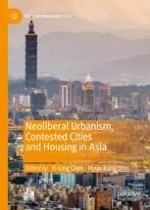2019 | OriginalPaper | Chapter
7. Development and Inequality in Urban China: The Privatization of Homeownership and the Transformation of Everyday Practice
Author : Sarah Tynen
Published in: Neoliberal Urbanism, Contested Cities and Housing in Asia
Publisher: Palgrave Macmillan US
Activate our intelligent search to find suitable subject content or patents.
Select sections of text to find matching patents with Artificial Intelligence. powered by
Select sections of text to find additional relevant content using AI-assisted search. powered by
